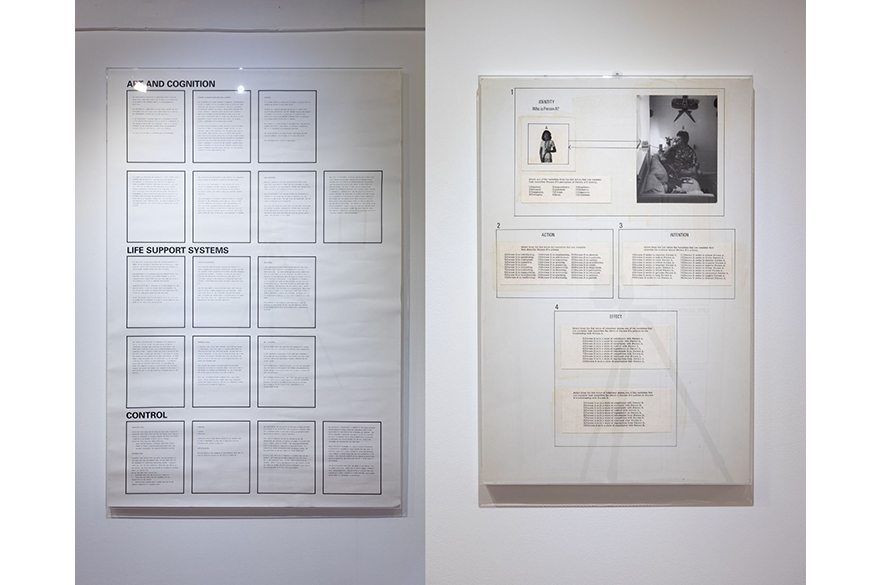NTU continues to document Nottingham’s art history by acquiring two new pieces by famous artist
Nottingham Trent University (NTU) has acquired two pieces of artwork from artist Stephen Willats to add to its art collection, reflecting the history of visual arts at both the University and Nottingham.
Published on 2 November 2022
Categories: Press office;

Stephen Willats is a pioneer of early conceptual art and has become one of the most significant and influential artists of the past 50 years.
Throughout his career, he has concentrated on ideas surrounding communication and social engagement and has initiated many seminal multi-media art projects.
In the early 1970s, the period from which the two pieces of artwork were produced, Stephen Willats was living in Nottingham and leading a radical and forward-thinking teaching programme within the Fine Art department at Nottingham College of Art and Design, which is now NTU’s Nottingham School of Art & Design.
The first piece of art which will be added to the NTU collection is Art and Cognition Manifesto (1969) which Stephen produced and printed in the Bonington building which is still part of NTU’s City Campus today.
This silkscreen on poster paper piece continued a tradition of manifesto writing that Stephen had begun around this time attempting to shape the thinking of the art community.
The second piece of work which NTU has acquired is The Telephone Conversation (1974), a collection of photographic prints, paint, typewriter text and ink on card.
The work concerns the relativity of people’s perceptions of each other and was very much informed by the ideas Stephen had whilst exploring Nottingham, even including several people associated with his time working at Nottingham College of Art and Design.
Alongside these two pieces of art, NTU has also purchased five issues of Control Magazine (Which Stephen was the Founder and Editor of) to exhibit. Control Magazine’s function was to provide a resource to artists to discuss their work and to make connections with other disciplines such as Social Sciences and Computer Sciences.
All of the pieces of Stephen Willats’ work that the University have acquired are displayed in the Bonington Gallery Foyer at NTU.
The NTU Art Collection is a permanent collection that comprises of more than 400 works of visual art, sculpture and craft that have been acquired through purchase, gift and bequest. It reflects the history that has shaped the University and provides a unique window into the development of the visual arts in both the University and Nottingham.
Works from the NTU Art Collection are distributed across three of the four campuses (City, Clifton and Brackenhurst) in academic schools, libraries and throughout the University’s main buildings.
Joshua Lockwood-Moran, Assistant Curator at Nottingham Trent University’s Bonington Gallery said: “The two new acquisitions for the NTU Art Collection are really significant; they demonstrate early examples of Stephen’s approach to art making and thinking, which he developed while working for Nottingham College of Art and Design.
“Knowing that he made the editions of the Art and Cognition Manifesto (1969) at the Bonington building is the perfect context for the artwork to be bought for the collection. It was great to have welcomed Stephen back to Nottingham to work with him on the current exhibition at Bonington Gallery.”
Stephen Willats Social Resource Project For Tennis Clubs exhibition is currently being held at Bonington Gallery until the 10th December. More information about the exhibition.
Notes for Editors
About Nottingham Trent University
Nottingham Trent University (NTU) received the Queens Anniversary Prize for Higher and Further Education in 2021 for cultural heritage science research. It is the second time that NTU has been bestowed the honour of receiving a Queen’s Anniversary Prize for its research, the first being in 2015 for leading-edge research on the safety and security of global citizens.
The Research Excellence Framework (2021) classed 83% of NTU’s research activity as either world-leading or internationally excellent. 86% of NTU’s research impact was assessed to be either world-leading or internationally excellent.
NTU was awarded The Times and The Sunday Times Modern University of the Year 2023 and ranked second best university in the UK in the Uni Compare Top 100 rankings (2021/2022). It was awarded Outstanding Support for Students 2020 (Times Higher Education Awards), University of the Year 2019 (Guardian University Awards, UK Social Mobility Awards), Modern University of the Year 2018 (Times and Sunday Times Good University Guide) and University of the Year 2017 (Times Higher Education Awards).
NTU is the 5th largest UK institution by student numbers, with nearly 39,000 students and more than 4,400 staff located across five campuses. It has an international student population of 7,000 and an NTU community representing over 160 countries.
Since 2000, NTU has invested £570 million in tools, technology, buildings and facilities.
NTU is in the UK’s top 10 for number of applications and ranked first for accepted offers (2021 UCAS UG acceptance data) It is also among the UK’s top five recruiters of students from disadvantaged backgrounds and was the first UK university to sign the Social Mobility Pledge.
75% of NTU students go on to graduate-level employment or graduate-entry education / training within fifteen months of graduating (Guardian University Guide 2021).
NTU is ranked 4th most sustainable university in the world and 1st in the UK for sustainability-themed Education and Research in the 2021 UI Green Metric University World Rankings (out of more than 900 participating universities).